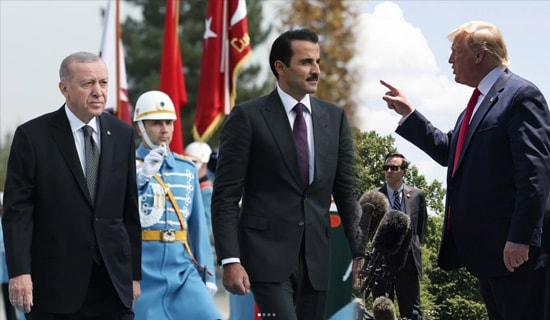Following the July 15-16 failed military coup in Turkey, Pakistani writer Abdul Qader Hassan wrote an article shedding light on the downfall of the Ottoman Caliphate in the early 1920s. In the piece, Hassan also noted that the Ottoman Caliph Sultan Suleiman (who ruled from 1520 to 1556) was poised to conquer Austria, but could not do so due to old age and the cold weather.
The Ottoman Caliphate was abolished in 1924 by Kamal Ataturk, who began an era of secularization whose influences the current Islamist government of President Recep Tayyip Erdogan has been trying to eradicate from the nation's public life by re-introducing Islamic influences such as the burqa (veil) and alcohol-free zones. The failure of the Turkey coup has been generally welcomed in the Islamic world, since Erdogan is seen as advancing the cause of Islam.
Abdul Qader Hassan's article was published by Roznama Express, a mass-selling Urdu-language newspaper published in the Pakistani cities of Islamabad, Karachi, Lahore, Quetta and Multan.
Following are excerpts from the article:
"It Is A Sad Story That The Christian Western Powers Ultimately Terminated This Government Ruling From... Istanbul"; "You Will Be Surprised [To Know] That The Hindu Leader Gandhi Was Also Part Of The Khilafat Movement"
"For those with interests in Islamic history, it seems like only yesterday the city of Istanbul was the city of their memories and dreams, where the flag of their Ottoman Caliphate flew for 500-600 years... For the Western powers, such a large Islamic government and such an expanding regime was unacceptable. It is a sad story that the Christian Western powers ultimately terminated this government ruling from a beautiful city like Istanbul. And the women of Istanbul were left with jewellery as symbols that Muslim women from the world over had sent to them as gifts of love and aid.
"Among this jewellery there was a large quantity that the Muslim women in India had sent during the Khilafat Movement [that defended the Ottoman Caliphate] as gifts for the Turks so they could sell them and continue their war and jihad. This jewellery is still safe with the elderly women of Turkey. They are very dear to them and their price cannot be paid in material wealth. When a tourist would sometime go to Turkey from India, these women would proudly show this jewellery to him.
"And such tourists would return carrying the treasures of their tears to India, which was a center of the [Khilafat] Movement for the Ottoman Caliphate; and the memories of the movement are still fresh. You will be surprised [to know] that the Hindu leader Gandhi was also part of the Khilafat Movement; and the point was that this movement was a movement for liberation from British imperialism; and Gandhi was the leader of the movement opposed to imperialism.
"I want to talk about the Turkey of today... whose Muslims have refused to accept the regime [i.e. the coup leadership] they disliked, which the world has dubbed as a rebellion involving several [military] generals and senior civil officials who were dismissed. I did not expect such a rebellion by the public of a Muslim country but it appears that in Turkey some virus of past freedom is alive, which does not allow this nation to sit still, and remains active in its brain. "
"With Much Sacrifice And Strategy The Western World Terminated This [Ottoman] Caliphate, Since If It Were Alive, It Would Not Have Been Possible For The Western World To Survive"
"Turkey was not merely a Muslim country. It was the living reality of the Islamic world, which the West had terminated with much labor and sacrifice, and which had been a danger to its existence. There is [evidence in] history as to how much was done to end the Ottoman Caliphate; and with much sacrifice and strategy the Western world terminated this Caliphate, since if it were alive, it would not have been possible for the Western world to survive. There is a long history of the Ottoman Caliphate, which ruled over the world for nearly 600 years...
"And history remembers the era when the ruling families of the Western world would wait for the consent of the Ottoman caliph to appoint their new king. The world remembers this statement of Sultan Suleiman [the Ottoman caliph]: 'Wherever my horse keeps its feet, that place comes under my rule'; and the reality was also the same. Whichever direction the Ottoman military moved, that region would be accepted as part of the Ottoman Caliphate because no one had the power that the Ottoman Caliphate had; and it was impossible to confront the Ottoman military.
"The elderly Sultan Suleiman regretted that he could not conquer Austria due to his old age. The second [obstacle] was the extreme cold weather, which was intolerable for the Ottoman army, and war could not be waged in such weather. However, some generals were courageous enough so that if the Sultan gave the order, they could have won this battle too. However, the Sultan did not deem it correct to accept their advice and declared it an emotional judgement...
"For the Ottoman Caliphate, which had conquered the world, this small European country [Austria] was nothing, but Sultan Suleiman remained regretful of his old age and the extreme weather. When the weather became good, the Sultan was advised to attack, but he refused to accept. Anyway, a small country in Europe remained safe from the sound and boom of Ottoman cannon, and even today it celebrates having escaped the military superpower of the time... It escaped from the Ottoman military but Turkey's disliked regime [i.e. the military coup leadership] could not, and was defeated by democracy."
Source: Roznama Express (Pakistan), July 20, 2016.




.jpg)